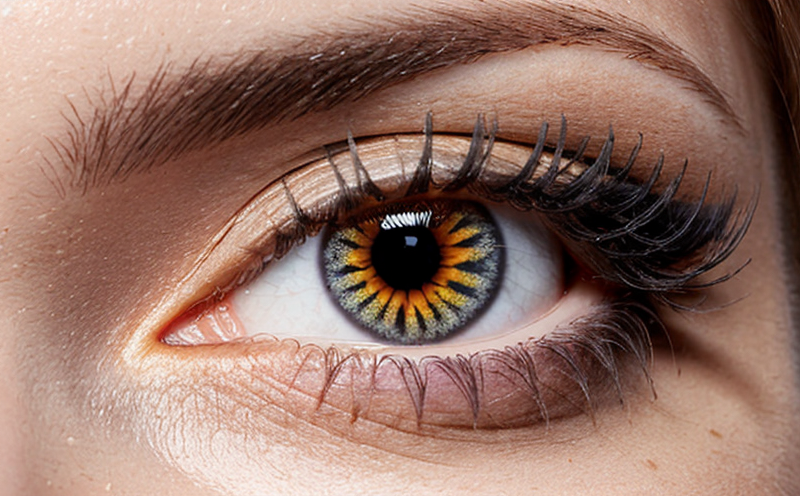Ocular Irritation Testing of Nanomaterials in Eye Cosmetics
The ocular irritation testing of nanomaterials used in eye cosmetics is a critical step towards ensuring the safety and efficacy of products aimed at the delicate ocular surface. This assessment is particularly vital given the potential for nanomaterials to behave differently from their bulk counterparts, potentially causing unintended adverse effects on the eyes.
The field of cosmetics, especially those targeting the ocular region, has seen an increasing trend towards incorporating nanomaterials due to their unique properties such as enhanced delivery systems and improved aesthetics. However, these materials pose a special challenge in terms of safety evaluation because they can behave unpredictably at the nanoscale.
The testing protocols for evaluating ocular irritation are stringent and must adhere to international standards like ISO 10993-11:2018, which specifically addresses biological evaluation of medical devices. This standard ensures that nanomaterials used in cosmetics undergo rigorous scrutiny to identify any potential risks.
Eurolab’s expertise lies in providing comprehensive and accurate testing services for these nanomaterials. Our team of specialists is equipped with the latest analytical techniques and facilities to perform these tests effectively, ensuring compliance with regulatory requirements across global markets.
The importance of this testing cannot be overstated. The ocular surface is highly sensitive; even minimal irritation can lead to discomfort, inflammation, or more severe conditions over time. Therefore, it's crucial for manufacturers to understand how their nanomaterials interact with the eye before bringing them to market.
Why It Matters
The ocular irritation testing of nanomaterials in eye cosmetics is not just about compliance; it’s about ensuring product safety and efficacy. Given the increased use of nanotechnology in cosmetics, it’s essential to understand how these tiny particles behave in real-world conditions.
Consumer trust is paramount in the beauty industry. Products that fail ocular irritation tests may lead to consumer dissatisfaction and potential legal action. Moreover, non-compliance could result in product recalls, damage to brand reputation, and lost sales opportunities.
From a regulatory perspective, compliance with standards like ISO 10993-11:2018 is mandatory for manufacturers. This ensures that products meet the highest safety standards before reaching consumers. Regulatory bodies across different countries often require these tests as part of their approval processes.
In addition to consumer and regulatory concerns, there are also ethical considerations. Testing procedures must be conducted humanely and ethically, minimizing any discomfort or distress on animals used in testing. This aligns with the principles of humane research practices.
Scope and Methodology
| Test Parameters | Specimen Preparation | Instrumentation | Acceptance Criteria |
|---|---|---|---|
| Assessment of ocular irritation potential using standardized test methods. | Preparation of nanomaterial solutions at various concentrations. | Use of slit lamp biomicroscopy and fluorescein staining techniques. | Evaluation based on clinical grading scales as defined by ISO standards. |
The scope of testing includes assessing the potential for ocular irritation caused by nanomaterials present in eye cosmetics. Specimen preparation involves creating solutions at varying concentrations to simulate real-world conditions accurately.
Eurolab utilizes advanced instrumentation such as slit lamp biomicroscopy and fluorescein staining techniques. These tools allow for precise observation of any changes in the ocular surface, providing valuable insights into the product's safety profile.
The acceptance criteria are strictly defined based on clinical grading scales provided by ISO standards. This ensures that results are consistent and reliable across different studies and laboratories.
Eurolab Advantages
At Eurolab, we pride ourselves on offering unparalleled expertise in ocular irritation testing of nanomaterials used in eye cosmetics. Our state-of-the-art facilities are equipped with the latest analytical techniques and instrumentation, ensuring accurate and reliable results.
Our team comprises highly qualified specialists who have extensive experience in this field. They stay updated with the latest developments in nanotechnology and regulatory requirements, ensuring that our services remain at the forefront of industry standards.
We understand the importance of timely delivery while maintaining high-quality standards. Our streamlined processes allow us to deliver results swiftly, enabling clients to make informed decisions promptly.
Our commitment to ethical research practices is reflected in every aspect of our operations. We ensure that all tests are conducted humanely and ethically, prioritizing both animal welfare and safety.





